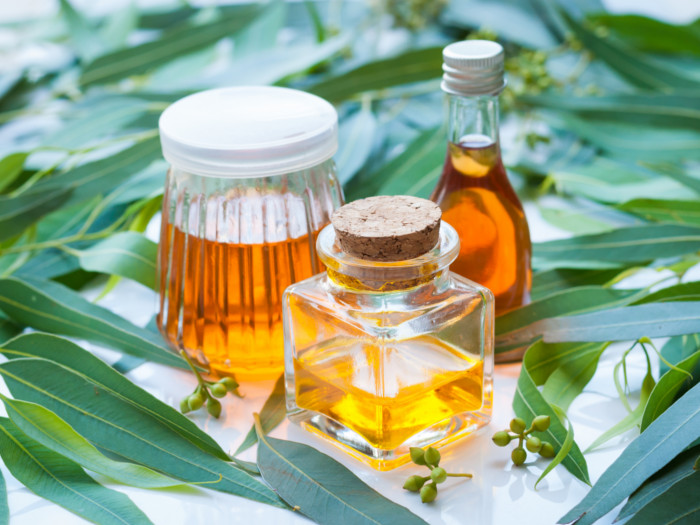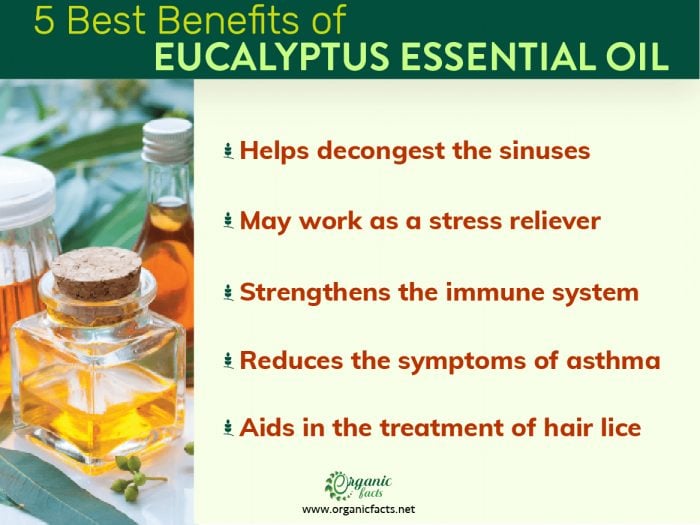Eucalyptus oil is derived from the leaf of the eucalyptus plant. The plant, belonging to the Myrtaceae family, is native to Australia. However, the use of eucalyptus essential oil is gaining popularity around the world. It is useful for various purposes and makes a great addition to your alternative remedies shelf. The oil is prepared via a steam distillation process. While it may be possible to prepare your own bottle at home, it is recommended to buy a ready-to-use bottle, especially if you are a beginner, and storing it the right way is very important.
Eucalyptus Essential Oil Benefits & Uses
Essential oils are really popular for aromatherapy purposes. Also known as essential oil therapy, aromatherapy is used by different people to different extents. The ultimate goal, more often than not, is achieving well-being by engaging the sense of smell. Different oils are used to achieve different purposes. Eucalyptus essential oil is also popular in aromatherapy.
Apart from this, there are other ways in which it is used and provides various benefits. Let’s explore some of the more prominent benefits of eucalyptus oil and how to use it.
Hair Care
Eucalyptus oil possesses antifungal properties. While this may serve many purposes, one that may come in most handy is using it as a part of your anti-dandruff hair care regimen. The oil, along with extracts from Mexican mint, can work well as an anti-dandruff agent, found a 2012 study. [1]
Another study tested a eucalyptus oil and lemon-scented tea tree extract solution against head lice in children and found it to be effective. [2]
How to use: While you may not have all these ingredients at home, here is an easy way to use eucalyptus essential oil for hair. Mix 2-3 drops of this oil in a carrier oil such as jojoba, coconut, or argan and massage it onto your scalp. Leave it for at least an hour or overnight if possible and wash it off in the morning. While the results may not be quick, they could be long-term.
Wound Healing
One of the most popular traditional uses of eucalyptus essential oil has been to disinfect and help heal wounds. It can be said that this use has stood the test of time and the oil is still used, in diluted form, to promote healing. An animal study that sought to compare it to gentamicin deemed the oil to be safe and non-toxic for use. It also found that oral administration is useful for its anti-inflammatory activity. [3]
How to use: In case of wounds, use 2-3 drops of the oil diluted in 100ml water. Use it as an antiseptic solution over the affected area regularly.

Freshly extracted eucalyptus oil Photo Credit: Shutterstock
Reduces Fever
While eucalyptus oil may not treat your fever and it is best to consult your doctor if you are running a temperature, the oil is commonly used in folk medicine to help alleviate the symptoms of fever.
How to use: Steam inhalation with a few drops of the essential oil can help break the fever, offer relief from muscle pain, and help ease respiration.
Cough & Cold Relief
While this may not be a solution for the underlying issue, steam inhalation with eucalyptus oil can provide relief from a blocked nose and breathing difficulties during a cough or cold.
How to use: Apart from steam inhalation, you can also mix a couple of drops with a couple of tablespoons of carrier oil (which you usually tolerate well) and lightly massaging it onto your chest and back. Avoid applying it on your face.
Pain Relief
Eucalyptus oil is analgesic and anti-inflammatory in nature. This means that it works well to reduce pain, whether it be by topical application through a carrier oil or safe ingestion. The oil does so by influencing both the central and peripheral nervous system responses. [4]
How to use: If you are experiencing muscle pain or soreness, massaging the oil mixed with a carrier oil, on affected areas in a circular motion helps relieve stress and pain.
Nail & Skin Care
Fungal infections, in the form of infected toenails and fungal acne, can affect anyone. Eucalyptus oil packs some effective antifungal properties. A 2015 study found it to be an effective solution, when applied topically, for fungal-infected toenails. It may also be a cheaper alternative to prescription topical antifungal agents for onychomycosis, a condition that causes progressive destruction of nail elements. [5]
Furthermore, eucalyptus oil can be used to help with jock itch, ringworm, athlete’s foot, thrush, and cold sores. [6]
How to use: Topical application to the affected area after blending a few drops with a carrier oil.
Dental Care
Eucalyptus essential oil is very effective against cavities, dental plaque, gingivitis, bad breath (halitosis), and other dental infections owing to its antimicrobial germicidal properties. This is why it is so commonly found as an active ingredient in mouthwash, toothpaste, and other dental hygiene products. [7]

Eucalyptus essential oil is obtained from fresh leaves of the tall, evergreen eucalyptus tree (Eucalyptus globulus, or less common).
Eucalyptus Oil Side Effects
As with most concentrated ingredients, essential oils can have some serious side effects if not used properly. Reports suggest that eucalyptus oil can prove toxic when used irresponsibly, without proper guidance. It is best to keep it away from children and not ingest it directly. [8]
For all uses, be sure to do a patch test before you put it to use. Before introducing any new essential oil in your routine, it is advisable to consult your doctor or have an allergy test done.
